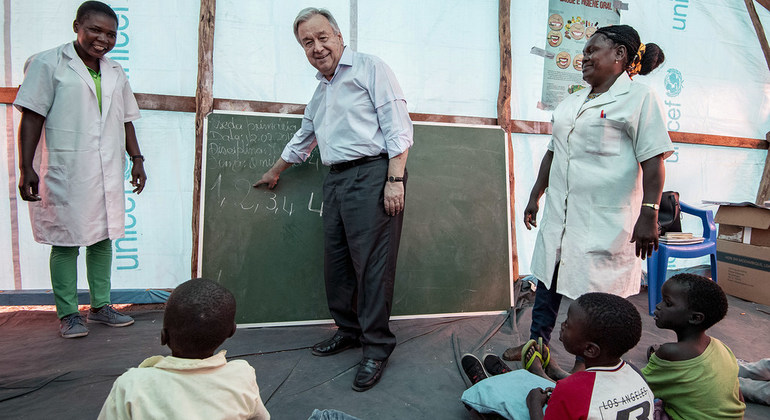UN chief meets survivors of devastating cyclones
Meeting schoolchildren in Mozambique’s second city of Beira on Friday, UN Secretary-General António Guterres learned that the homes of nearly every student had been destroyed by cyclones.
The UN chief was on the final day of his visit to Mozambique, to see for himself the damage caused by Cyclones Kenneth and Idai, the most destructive to cross southern Africa in decades.
Mr. Guterres promised the children whose school roof was ripped off by Cyclone Idai, will be rebuilt, and to continue their studies. He also met a group of disabled survivors and declared that the UN is committed to doing everything possible to help the most vulnerable people.
He later visited the Mandruzi camp, which shelters 480 families displaced by the catastrophe and living in tents provided by UN agencies, where he told waiting media that the current situation underlines the gravity of the problem, and the need for international aid.
Read our full story here.
One month of Arctic fires equivalent to Sweden’s annual emissions, says UN weather agency
The climate crisis, which has led to unusually hot and dry conditions, is amplifying the risk of wildfires, particularly in the Arctic. The news comes from the latest World Meteorological Organization (WMO) briefing, which was released on Friday.
Over 100 intense and long-lived wildfires have been tracked since the beginning of June. That month alone, the fires emitted 50 megatonnes of carbon dioxide into the atmosphere, which is equivalent to Sweden’s total annual emissions.
The UN weather agency warns that, as well as the direct threat from burning, wildfires also release harmful pollutants such as particulate matter and toxic gases, such as carbon monoxide, into the atmosphere.
The WMO has produced an animation explaining some of the risks of wildfires, and what they are doing to improve forecasting, and help farmers adapt to the changing climate:
UN’s Guterres condemns ongoing airstrikes on Syria’s hospitals, medical workers
Reports that airstrikes have hit several health facilities in north-west Syria have been strongly condemned by the UN Secretary-General. In a statement, António Guterres said that one of the damaged facilities included a large hospital in Maarat al Numan whose location was known to the warring parties.
The development follows an escalation of violence since April in Idlib, the last opposition-held enclave in the country. Some three million people live there, many of them displaced by clashes between Government and opposition fighters.
Mr. Guterres insisted that civilians and public buildings must be protected, in line with a 2018 de-escalation agreement overseen by guarantors Russia and Turkey, and insisted that those responsible for carrying out serious violations of international humanitarian law should be held accountable.
Find out more here.
UN human rights office alarm over death sentences for 30 men in Houthi-held Sana’a
The UN human rights office, OHCHR, said on Friday that it is deeply alarmed at death penalty sentences handed down to 30 men in Yemen’s capital, Sana’a, noting credible allegations of torture and ill-treatment.
In an appeal to the de facto Houthi authorities in Sana’a to dismiss the likely politically motivated charges, OHCHR spokesperson Ravina Shamdasani said that most of the men were academics, students and politicians affiliated with an opposition movement.
Sana’a, in the west of the Arabian peninsula State, has been under the control of the Houthis since late 2014, after they drove out forces loyal to President Abdrabbuh Mansour Hadi.
From March 2015 until end of June 2019, OHCHR has documented 7,659 civilians killed and 12,305 injured in the ongoing conflict, it said on Friday.
Human Rights Council session votes to probe Philippines’ deadly ‘war on drugs’
The Human Rights Council in Geneva has urged the Philippines Government to do more to prevent extrajudicial killings, linked to its campaign against illegal drug use.
In a close vote, the 47-Member Council adopted a resolution which expressed concern that since President Rodrigo Duterte announced his so-called war on drugs in 2016, there have been allegations that thousands of people involved with the drug trade and drug use have been killed.
The resolution – which was adopted on Thursday by 18 votes in favour to 14 against with 15 abstentions – also appeals to the authorities to investigate the deaths and to hold perpetrators accountable.
The text also calls on the Philippines Government to cooperate with the Office of the High Commissioner for Human Rights by facilitating country visits and “refraining from all acts of intimidation or retaliation” against rights experts.
Listen to or download our audio News in Brief for 12 July on Soundcloud:







